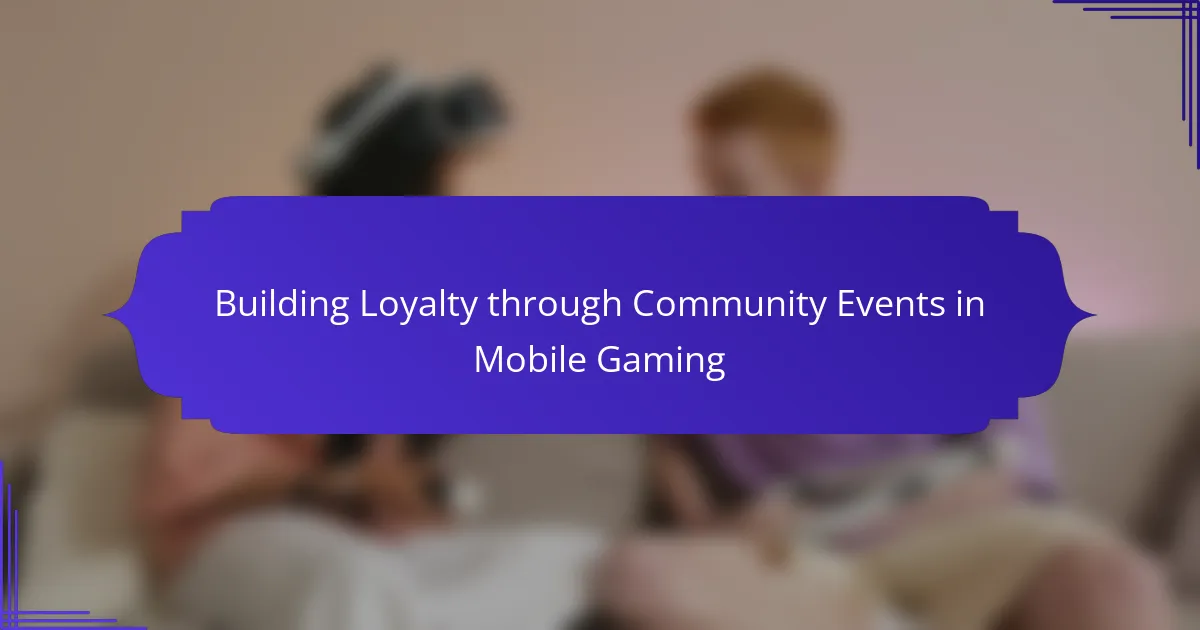Building loyalty in mobile gaming relies on effective community events. These events enhance player engagement through social interactions and collaborative challenges. Platforms like Discord and Twitch facilitate real-time connections, while user-generated content fosters a sense of belonging. Measuring success through engagement metrics and player feedback helps developers refine their strategies for stronger community ties.
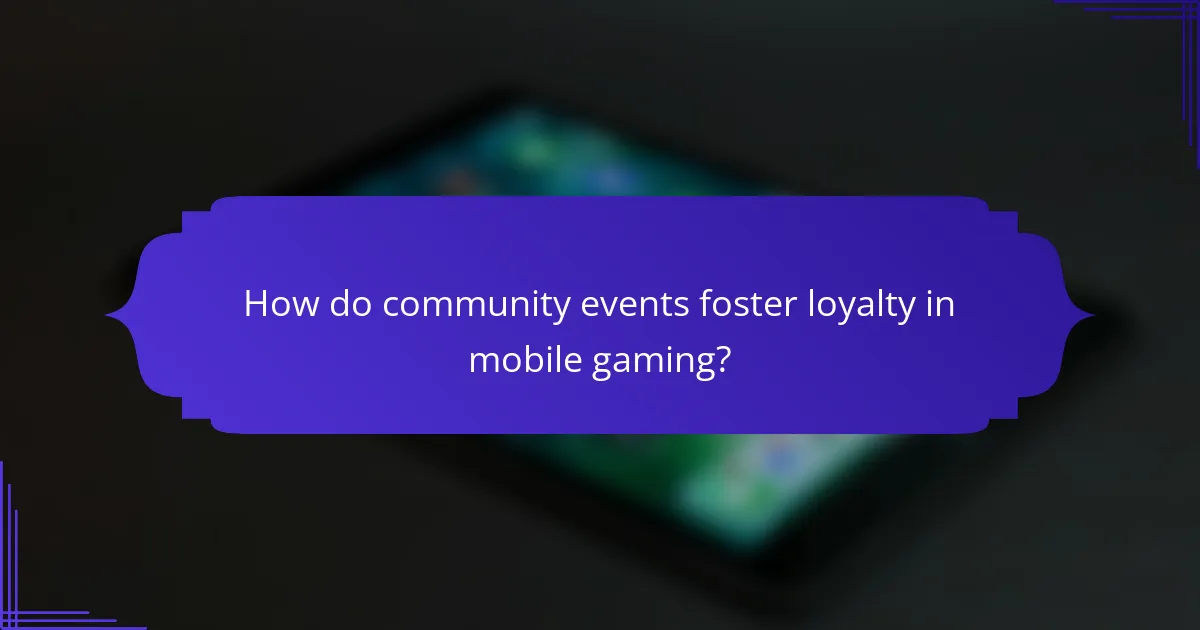
How do community events foster loyalty in mobile gaming?
Community events foster loyalty in mobile gaming by creating a sense of belonging among players. These events enhance player engagement through social interactions and collaborative challenges. Players often form lasting connections, leading to increased retention rates. Exclusive rewards from events further incentivize participation, reinforcing loyalty.
What psychological factors drive player engagement at events?
Psychological factors driving player engagement at events include community connection, competition, and rewards. Engaging players fosters loyalty and enhances their gaming experience. Community events create social bonds, increasing emotional investment. Competition motivates players to improve skills, while rewards provide tangible benefits, reinforcing participation.
Which types of community events are most effective for building loyalty?
Community events that foster interaction and engagement are most effective for building loyalty in mobile gaming. These events create memorable experiences that enhance player connection to the game and its community.
1. Tournaments encourage competition and skill showcase, fostering camaraderie among players.
2. Seasonal events introduce fresh content, keeping players engaged and excited about new challenges.
3. Developer Q&A sessions build transparency and trust, allowing players to feel valued and heard.
4. Social media challenges promote sharing and community involvement, enhancing visibility and player interaction.
5. In-game meetups allow players to form connections, strengthening community bonds.
These types of events leverage unique attributes of mobile gaming, such as accessibility and social interaction, to create lasting loyalty.
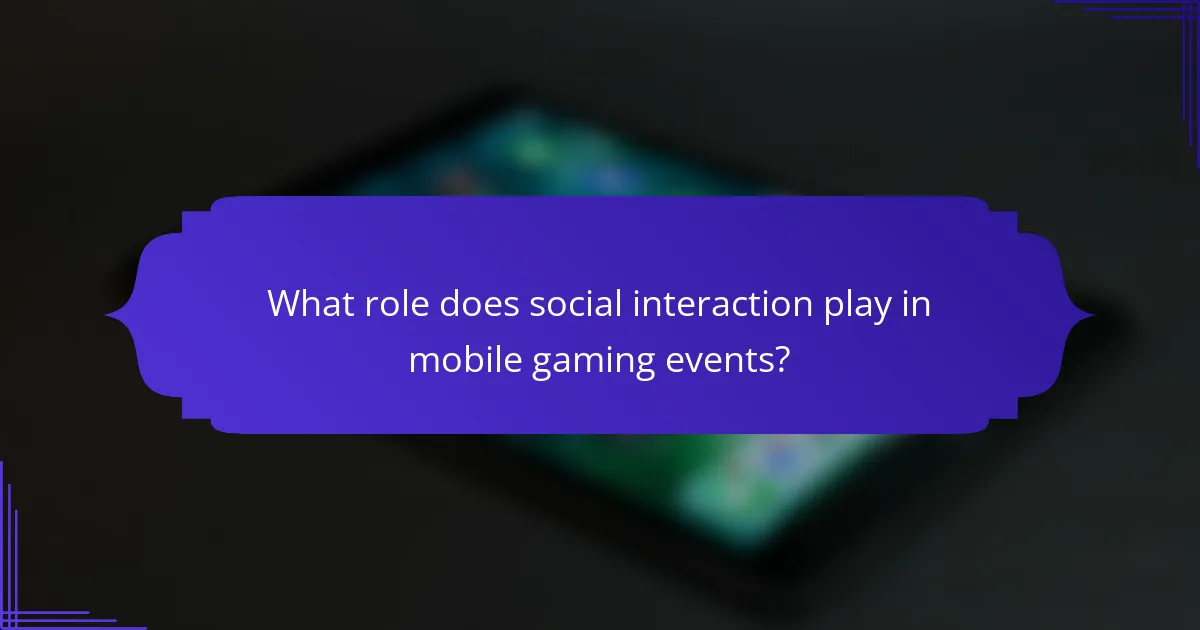
What role does social interaction play in mobile gaming events?
Social interaction is crucial for building loyalty in mobile gaming events. It fosters community, enhances player engagement, and encourages long-term participation. Players who interact during events feel more connected, which increases their commitment to the game. This sense of belonging can lead to positive word-of-mouth and higher retention rates. Community-driven events create opportunities for collaboration, competition, and shared experiences, making players more likely to return. Ultimately, social interactions during these events cultivate a loyal player base that supports the game’s growth and success.
How do players perceive their relationships with developers during events?
Players perceive their relationships with developers during events as crucial for loyalty. Engaging community events foster a sense of belonging and trust. Developers who actively communicate and respond to player feedback enhance these relationships. This interaction leads to increased player retention and satisfaction, reinforcing loyalty to the game.
What impact does player collaboration have on loyalty?
Player collaboration enhances loyalty by fostering a sense of community. Engaging in community events allows players to connect, share experiences, and build relationships. This interaction creates a more immersive gaming environment, leading to increased player retention. As a result, players are more likely to remain loyal to the game, contributing to its long-term success. Community-driven events also encourage players to invest time and resources, reinforcing their commitment.
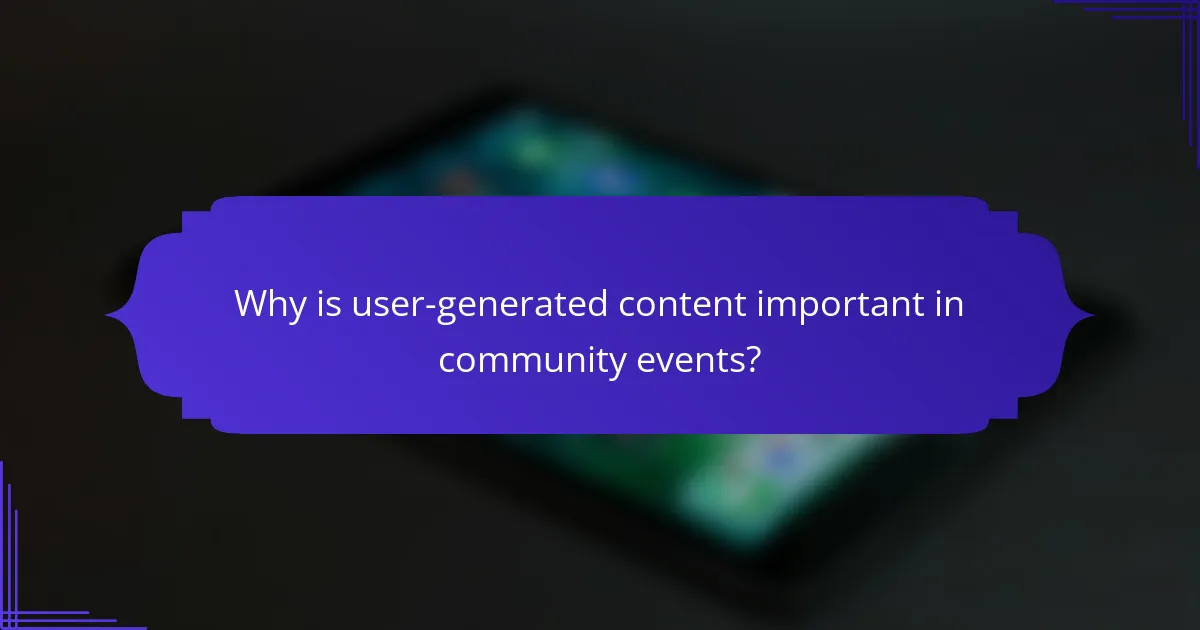
Why is user-generated content important in community events?
User-generated content is crucial for community events in mobile gaming as it fosters engagement and loyalty. When players contribute their experiences, it creates a sense of ownership and belonging. This participation enhances the community’s vibrancy, encouraging more players to join and interact. Additionally, user-generated content serves as authentic testimonials, attracting new users and reinforcing existing relationships. Engaging with this content further deepens players’ emotional ties to the game, ultimately driving retention and satisfaction.
How can developers encourage player contributions during events?
Developers can encourage player contributions during events by creating engaging, interactive experiences. Incorporating community feedback into event design fosters a sense of ownership and loyalty.
1. Host contests that reward players for their contributions, such as fan art or game strategies.
2. Implement a voting system where players can choose event themes or features.
3. Offer exclusive in-game rewards for participants, increasing motivation to contribute.
4. Create forums or social media groups for players to share ideas and collaborate on event planning.
These strategies enhance community involvement, ultimately strengthening player loyalty in mobile gaming.
What are the benefits of showcasing player achievements at events?
Showcasing player achievements at events builds loyalty by fostering community engagement and recognition. Players feel valued, enhancing their emotional connection to the game. This recognition encourages participation and motivates players to achieve more. As a result, it cultivates a vibrant community atmosphere that attracts new players and retains existing ones.
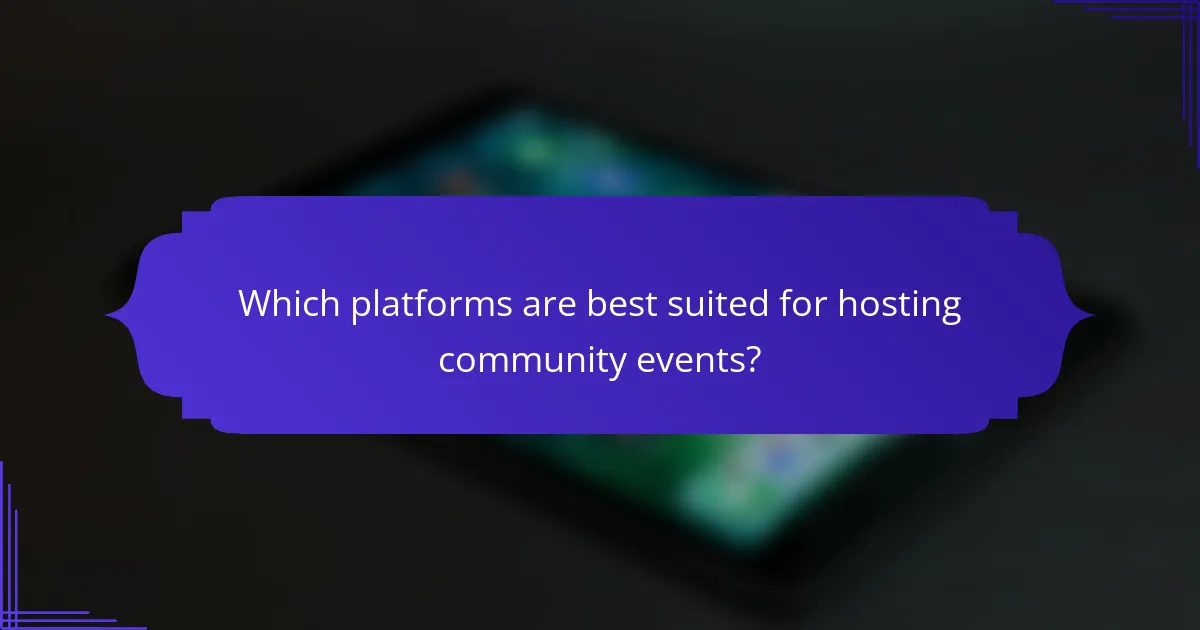
Which platforms are best suited for hosting community events?
Platforms best suited for hosting community events in mobile gaming include Discord, Twitch, Facebook Gaming, and Eventbrite. Each platform offers unique features that enhance player engagement and loyalty.
Discord provides real-time communication and community-building tools, making it ideal for ongoing interactions. Twitch allows for live streaming events, fostering a dynamic connection between gamers and developers. Facebook Gaming leverages social networking to reach a broader audience. Eventbrite is effective for organizing larger events, enabling ticketing and scheduling.
Utilizing these platforms can significantly enhance community loyalty through interactive and engaging experiences.
How do mobile platforms differ in supporting community engagement?
Mobile platforms vary in their support for community engagement through features, accessibility, and event integration. Some platforms offer robust social tools, enabling players to connect seamlessly. Others may have limited options, affecting user interaction. Enhanced features like in-game events or community challenges can foster loyalty, while platforms lacking these may struggle to maintain engagement. Additionally, mobile platforms differ in their ability to provide personalized experiences, which can significantly impact community involvement.
What are the technical considerations for event hosting on mobile?
Event hosting on mobile requires careful consideration of platform compatibility, user engagement, and technical infrastructure. Ensuring seamless performance across devices enhances player loyalty and community interaction.
Key technical considerations include:
1. **Network Stability**: Reliable internet connections are crucial for real-time interactions.
2. **Scalability**: The infrastructure must support varying numbers of participants without lag.
3. **User Interface**: Intuitive design enhances accessibility and user experience.
4. **Security**: Protecting user data and privacy builds trust within the community.
5. **Integration**: Compatibility with existing gaming systems and social media platforms fosters engagement.
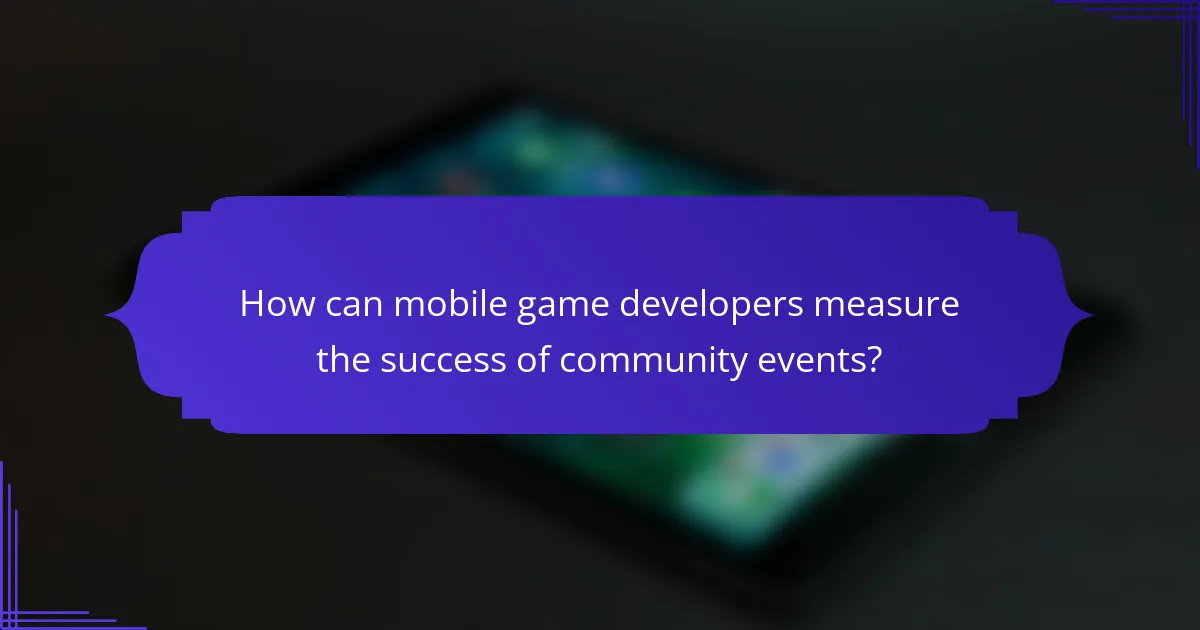
How can mobile game developers measure the success of community events?
Mobile game developers can measure the success of community events through engagement metrics, player feedback, and retention rates. Tracking participation levels during events indicates interest and community involvement. Analyzing player surveys provides insights into satisfaction and areas for improvement. Retention rates before and after events reveal their impact on player loyalty. Additionally, social media interactions can reflect community sentiment and event reach. These metrics collectively inform developers about the effectiveness of their community-building efforts.
What metrics are most relevant for assessing player loyalty?
Player loyalty in mobile gaming can be assessed through engagement metrics, retention rates, and community interaction levels. Key metrics include daily active users, session length, and event participation rates. These indicators reflect players’ commitment and satisfaction with community events. For example, a 30% increase in event participation correlates with improved player retention. Additionally, tracking feedback from community events can reveal unique insights into player preferences, enhancing loyalty strategies.
How can feedback from events inform future development?
Feedback from events can significantly enhance future development by identifying player preferences and engagement levels. Analyzing participant responses enables developers to tailor content, improve game mechanics, and foster community connections. This iterative process strengthens player loyalty and satisfaction, ultimately driving retention rates. For instance, direct feedback can reveal which event features were most appealing, guiding future event planning. Additionally, incorporating player suggestions can lead to unique attributes that differentiate the gaming experience, enhancing overall enjoyment and community involvement.
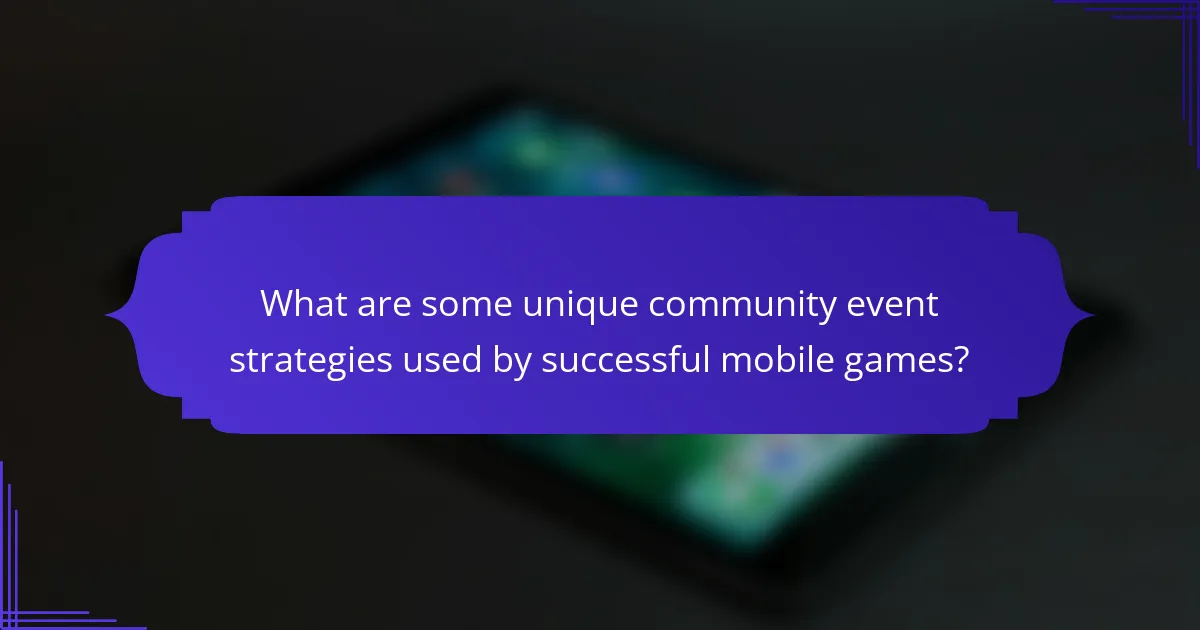
What are some unique community event strategies used by successful mobile games?
Successful mobile games build loyalty through unique community event strategies that foster engagement and player connection.
One effective approach is hosting limited-time events that offer exclusive rewards, encouraging participation and creating urgency. For instance, seasonal events often introduce themed content and unique challenges, enhancing player experience.
Another strategy involves integrating social features, such as team-based competitions or collaborative quests, which promote camaraderie among players. This creates a sense of belonging and encourages players to invite friends, expanding the community.
Personalization of events, such as tailoring challenges based on player behavior or preferences, can also enhance engagement. By recognizing individual players, games can create a more meaningful connection, making players feel valued within the community.
How do cultural differences influence event strategies in mobile gaming?
Cultural differences significantly shape event strategies in mobile gaming by influencing player engagement and community building. Understanding local customs, preferences, and social behaviors allows developers to tailor events that resonate with specific audiences. For instance, incorporating culturally relevant themes can enhance participation and loyalty.
In regions where community ties are strong, collaborative events can foster deeper connections among players. Conversely, in cultures that value competition, competitive events may drive higher engagement. Recognizing these nuances enables developers to optimize their strategies effectively, ultimately enhancing player retention and satisfaction.
Data shows that games designed with cultural considerations see a 30% increase in player retention compared to those that do not. This highlights the importance of cultural sensitivity in event planning within mobile gaming.
What innovative formats have emerged in mobile gaming events?
Innovative formats in mobile gaming events include virtual tournaments, live-streamed competitions, and interactive community challenges. These formats enhance player engagement and foster loyalty by creating immersive experiences. For example, augmented reality events allow players to participate in real-time challenges within their environment. Additionally, social media integration enables players to share achievements, increasing community visibility and interaction. Mobile gaming events now prioritize user-generated content, allowing players to contribute ideas and designs, further deepening their connection to the game.
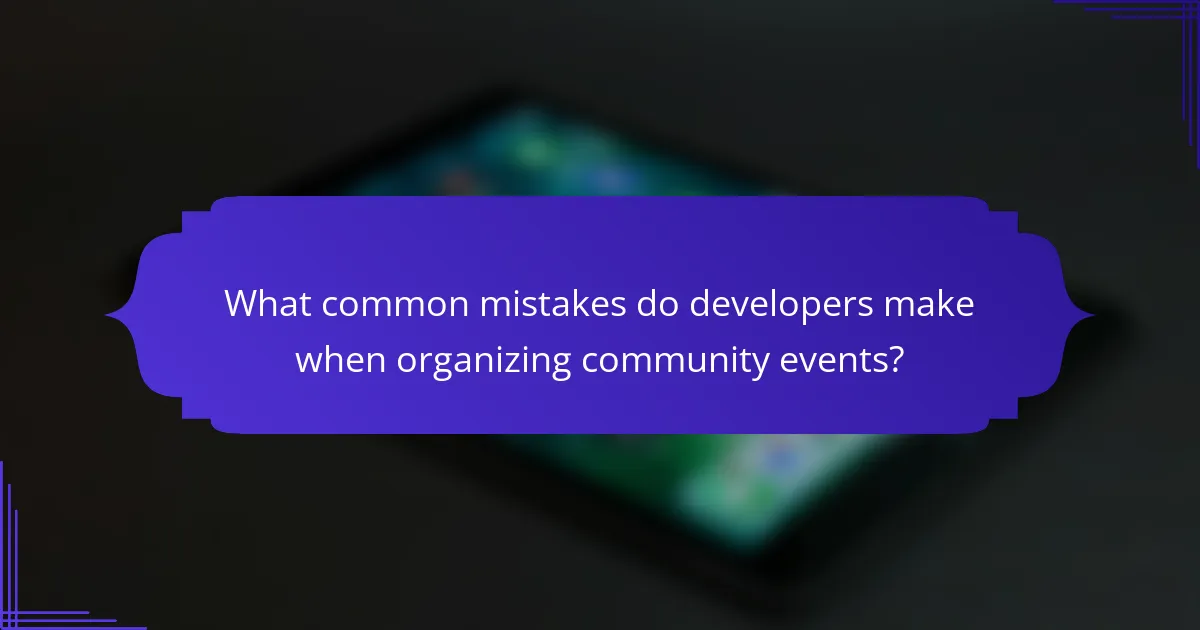
What common mistakes do developers make when organizing community events?
Developers often make mistakes like inadequate planning, neglecting community feedback, and failing to promote events effectively. These errors can hinder loyalty in mobile gaming communities.
Inadequate planning leads to poorly organized events that fail to engage players. Without community feedback, developers miss opportunities to tailor events to player preferences. Ineffective promotion results in low attendance, diminishing the event’s impact and community engagement.
Additionally, overlooking inclusivity can alienate segments of the player base. Not providing clear communication about event details can create confusion and frustration. Lastly, failing to follow up post-event can lead to missed opportunities for building lasting relationships.
How can developers avoid pitfalls in event planning?
Developers can avoid pitfalls in event planning by focusing on community engagement and clear communication. Prioritize understanding player interests to create relevant events. Establish a timeline with key milestones to manage tasks effectively. Gather feedback post-event to improve future planning. Leverage analytics to assess event success and player participation.
What lessons can be learned from unsuccessful community events?
Unsuccessful community events highlight the importance of understanding player preferences and engagement strategies. Key lessons include the need for clear communication, targeted marketing, and genuine interaction. Failing to analyze player feedback often leads to missed opportunities for improvement. Additionally, timing and relevance are crucial; events should align with player interests and game updates.
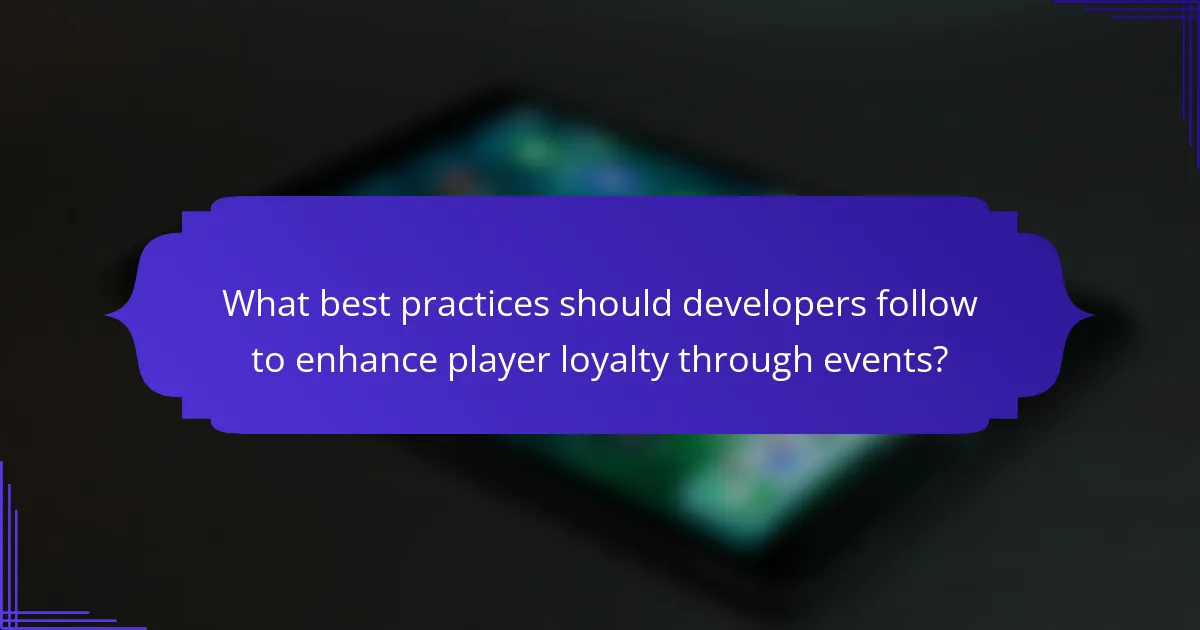
What best practices should developers follow to enhance player loyalty through events?
Developers should create engaging, themed events and offer exclusive rewards to enhance player loyalty. These events foster community interaction, encouraging players to participate and connect. Regularly updating event content keeps players returning. Additionally, leveraging player feedback can help tailor events to community preferences, increasing satisfaction and retention.
How can developers create a welcoming environment for all players?
Developers can create a welcoming environment for all players by fostering inclusivity through community events. Engaging players in collaborative activities encourages connection and loyalty. Events like tournaments, themed challenges, and social gatherings can enhance player interactions. These initiatives also promote a sense of belonging, making players feel valued and heard. By actively listening to community feedback, developers can tailor events to meet diverse player interests, ensuring that everyone feels represented and included.
What ongoing engagement strategies should follow community events?
To maintain engagement after community events, implement follow-up communication, exclusive rewards, and ongoing content updates. These strategies foster loyalty and encourage player retention.
1. Personalized Communication: Send tailored messages to participants, thanking them for attending and sharing highlights.
2. Exclusive In-Game Rewards: Offer unique items or bonuses to event attendees, enhancing their gaming experience.
3. Community Challenges: Introduce ongoing challenges that build on event themes, encouraging ongoing participation.
4. Regular Updates: Provide consistent updates on game developments and upcoming events to keep players informed and engaged.
